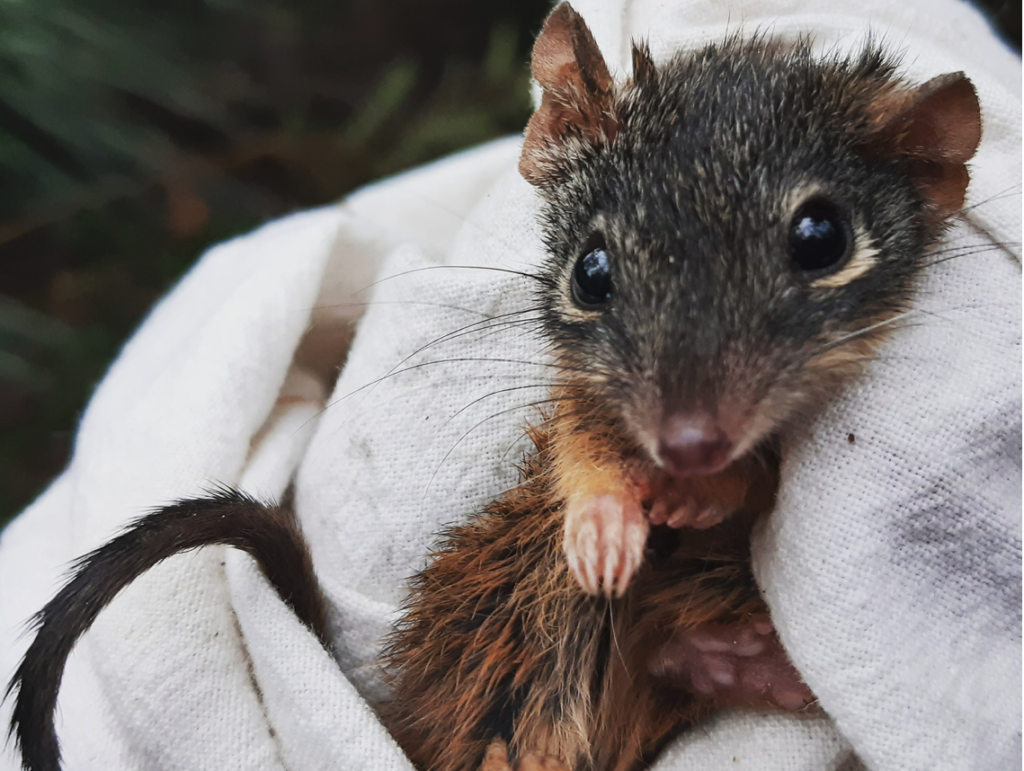Action and support needed to save local endangered species in the Adelaide Hills
Conservation groups are calling nature-lovers to help endangered wildlife impacted in the recent Cherry Gardens bushfire.
The early 2021 Adelaide Hills bushfire has devastated 2,700-hectares in wildlife habitat, with many South Australian conservation groups expressing their concerns about habitat recovery for two nationally endangered species and their fellow wildlife.
Friends of Scott Creek President, Jim Spiker said, “We have been shocked by the continuing reports of hundreds of native animals that have been casualties of this fire. The terrain is unrecognisable with lush undergrowth reduced to powdery ash. We cannot estimate the number of birds that have perished. Our long-term bird-banding program processed 379 birds in 2019 with over 20% being recaptures. Many of these were more than 4 years old but included a White-browed Scrubwren of 17+ years. All of these recaptures were processed within 200 metres of their first capture. The habitat for these birds no longer exists.”.
Volunteers are urging state government and local authorities to commit to the five years of support needed to ensure habitat recovery across the burnt area by:
- increasing best-practice bushcare for wildlife-friendly weed control
- sustaining grazing control (feral deer and goats and managing kangaroo impacts);
- monitoring wildlife numbers to ensure actions are aiding recovery.

Image: Antechinus = yellow-footed antechinus (Antechinus flavipes); SA endangered
Meanwhile, the public are encouraging to help by:
1. Protect all bushland habitat on personal property, provide habitat for wildlife survivors by laying large hollow logs, and share wildlife sightings by downloading the iNaturalist app so there's a better picture of who’s survived and where.
2. Volunteer to help Friends of Scott Creek Conservation Park with bushcare and surveys to protect habitat in the unburnt area – and burnt area when it’s safe.
3. Contact local members of parliament to help Mount Bold Reserve and Scott Creek Conservation Park get the 3–5 years of support needed – for wildlife, and for everyone who wants to them to stay wild.
4. Donate to the Friends of Scott Creek Conservation Park Fire Recovery Project who have established a Go Fund Me page.
The bushfire raged mostly across the Mt. Bold Reservoir Reserve and Scott Creek Conservation Park – a biodiversity hotspot which is home to many native wildlife. Dr Jasmin Packer, University of Adelaide and Environment Institute Wildlife Ecologist, explained,
“The core remaining habitat for nationally endangered Chestnut-rumped Heathwren and Southern Brown Bandicoots, and our tiny Brown Thornbills, is right here in the heart of the Mt. Lofty Ranges”. “Six of our 14 long-term mammal monitoring sites were decimated by the fire. Bandicoots have been spotted in the habitat refuge near one of those sites – but we need to support their habitat to recover as quickly as possible so they can re-colonise throughout the burn area”.
Fire crews and staff at the National Parks and Wildlife Service worked tirelessly to protect the park and ensure residents’ safety. While they tackle the challenge of making the area safe for everyone, local residents and community conservation groups are keen to get started with caring for their park. The summer fires of 2019-20 saw the nation lose over one billion animals and, in this biodiversity hotspot, the precarious remaining habitat was already facing pressure from housing developments, little-by-little land clearing, and climate change.
The evidence-based, 5 year plan would continue to be a community-led collaboration with state government and other partners. The Hills community, including National Parks and Wildlife staff are involved, however a clear 5 year commitment to jobs for best-practice bushcare, grazing control, and wildlife monitoring will ensure populations recover. Endangered wildlife, and everyone who cares about them, will benefit as the conservation community strive to protect this beloved Adelaide Hills biodiversity hotspot.
Further media information:
Jeff Smith - Creative Consulting
jeff@jeff-smith.com.au
0402 677 389
Spokespeople:
Dr Jasmin Packer – Environment Institute, University of Adelaide – Research Fellow / Wildlife Ecologist, and Friends of Scott Creek Conservation Park member @jasmin_packer
Jim Spiker – President – Friends of Scott Creek Conservation Park and Birder president@friendsofscottcreekcp.org.au
Supporters:
Friends of Scott Creek Conservation Park (Bushcare for habitat recovery)
with support from:
Animals Anonymous
Aldgate Valley Landcare Group
Bandicoot Springs Airbnb
Bimbimbie Hideaway Airbnb
Birds SA
Environment Institute, University of Adelaide (tracking wildlife recovery to target resources where they’re needed most)
Friends of Charleston Conservation Park
Friends of Lobethal Bushland Park
Friends of Mark Oliphant Conservation Park
Landcare SA
Longwood Bradbury Progress Association
Minimal Disturbance Bushcare
Minton Farm Native Animal Rescue Centre
Mylor Parklands Bushcare Group
Nature Conservation Society of South Australia
Nature Foundation
NRMJobs
Save Our Wildlife Foundation Inc
Sturt Upper Reaches Landcare Group
The Friends of Woorabinda Bushlands
Trees for Life (bushcare for habitat recovery)
Woodcutter’s Road Environment Protection Association
Conservation SA

Newsletter & social media
Join us for a sensational mix of news, events and research at the Environment Institute. Find out about new initiatives and share with your friends what's happening.
